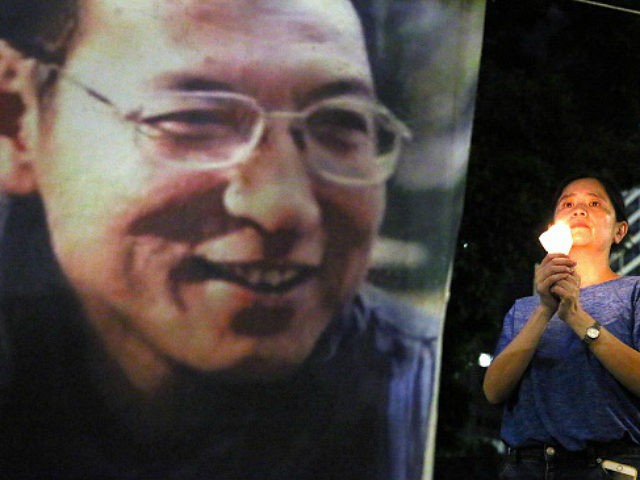The Chinese government worked very hard to erase the existence of Nobel Prize-winning dissident Liu Xiaobo, making it a criminal offense merely to mention his name.
Visitors to China have reported this effort was so successful that average citizens responded to mentions of the imprisoned professor with blank stares, and even the staff of the hospital where he was treated for cancer claimed not to know who he was.
Nevertheless, Chinese citizens are finding clever ways to dodge the Beijing Internet police, celebrating the life of the famed democracy activist and mourning his death in custody this week.
The New York Times finds users of social media services like Weibo and WeChat interpreting a massive thunderstorm over Beijing as either a celestial salute to a certain unnamed “hero,” or divine judgment for his death. The South China Morning Post reports that almost ten percent of the huge number of social media posts censored by the government after Liu’s death contained the Chinese words for “rain” and “storm.”
Another popular salute to Liu is posting photographs of an empty chair, symbolizing the way his Nobel Peace Prize was awarded to an empty chair in Oslo in 2010 because Liu’s captors would not allow him to attend the ceremony. Another popular tribute, the image of a burning candle, sparked a frenzy of deletions by censors.
Censorship filters have been avoided by referring to the late activist by other names, such as “Wang Xiaobo” “The Old Knight,” or “Teacher Liu.” However, his admirers seem determined to repeat his most famous quote verbatim, no matter how many government search algorithms it triggers: “I have no enemies and no hatred.”
Liu was also a professor of literature and a poet, so his supporters have been defying the censors by posting lines from his poems. A popular tactic is to post scans of the poetry as images, rather than uploading them as text that could be easily detected by censors.
CNN reports that the Communists have also blacked out broadcasts mentioning Liu’s death. Chinese-language media simply failed to mention his passing, while English-language publications in China strove to portray him as a confused victim led astray by the West, or a common criminal who died in spite of the benevolent State’s heroic efforts to treat his cancer.
Although the Communist paper Global Times produced the expected sneering editorial about Liu’s wasted life as a puppet of the West, CNN notes that it apparently felt enough shame to delete a Tweet that said, “The person’s gone but a blockbuster tear-jerker is just on – we’ll sit back and enjoy the show.” The Financial Times spotted a similar snarky message on Weibo from the Global Times that said, “We’ll sit here for the night eating watermelon seeds with the crowd.”
Another aspect of China’s venal handling of Liu’s death noted by CNN is that the Foreign Ministry sent its few statements on the matter directly to foreign journalists, rather than posting them on its website where Chinese citizens might see them.

COMMENTS
Please let us know if you're having issues with commenting.